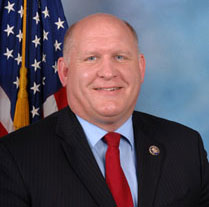U.S. Reps. Glenn ‘GT’ Thompson (PA-15) and G.K. Butterfield (NC-01) introduced on Thursday the bipartisan Helping Ensure Access to Local TeleHealth, or the HEALTH Act.
The bill will codify Medicare reimbursement for community health centers and rural health clinics for telehealth services.
The COVID-19 pandemic has underscored the value telehealth adds to communities across the nation, particularly in rural America.
The HEALTH Act seeks to extend benefits and access of this critical healthcare medium to more seniors, regardless of their geographic location.
“As a lifetime resident of rural Pennsylvania and having spent nearly three decades as a therapist and licensed nursing home administrator, I have been amazed at how telehealth services make life easier for rural and underserved communities—particularly older Americans,” said Thompson.
“The HEALTH Act will cut red tape and provide community health centers and rural health clinics the ability to offer these vital services to their patients on a more permanent basis.”
“Access to telehealth has become more than just a convenience, but rather a critical necessity in America,” said Butterfield.
“All patients, particularly our Medicare recipients, are in need of a solution to ensure access to telehealth services are free from undue barriers and restrictions.
“That is why I am proud to join Congressman GT Thompson in introducing this vital legislation to address the telehealth needs of Medicare patients during this pandemic and beyond.”
“Telehealth has emerged as a vital tool for health centers during the COVID-19 pandemic, connecting patients to services when restrictions prevented routine and ongoing care,” said Steve Carey, chief strategy officer of the National Association of Community Health Centers (NACHC).
“We are incredibly grateful for the leadership of Representatives G.T. Thompson and G.K. Butterfield to ensure that health centers are able to continue utilizing telehealth services and to be reimbursed adequately for doing so, both during and post the time of this pandemic.
“This enables health centers to continue to meet the needs of the nation’s underserved in times of emergency and for the future.”
“As the nation’s largest network of primary care providers, Federally Qualified Health Centers (FQHC) and Rural Health Clinics (RHC) provide a wide array of services in underserved areas of the country, both rural and urban” said Cheri Rinehart, president and chief executive officer of Pennsylvania Association of Community Health Centers (PACHC).
“The ability to use telehealth during the pandemic has clearly demonstrated how it can play a role in improving health equity by increasing access to care for the vulnerable populations FQHCs serve and boosting clinical outcomes.”
“The HEALTH Act recognizes the new normal that community health centers and our patients are living in. The pandemic has led community health centers nationwide to adopt innovations like telehealth in order to protect the safety of patients and the medically underserved communities we serve. Through the temporary telehealth changes thus far, community health center patients have been able to access primary care and behavioral health services while physically distancing to limit spread of coronavirus. However, patients and providers alike will benefit from permanent telehealth access even once the virus is under control,” said Chris Shank, CEO and president, North Carolina Community Health Center Association.
“Allowing patients to connect virtually to their health care provider removes significant barriers like transportation, which disproportionately affects patients with lower incomes and those living in rural communities.
“The HEALTH Act will reduce longstanding barriers to health care access by reducing red tape and providing sustainable reimbursement for telehealth services provided by community health centers.”
